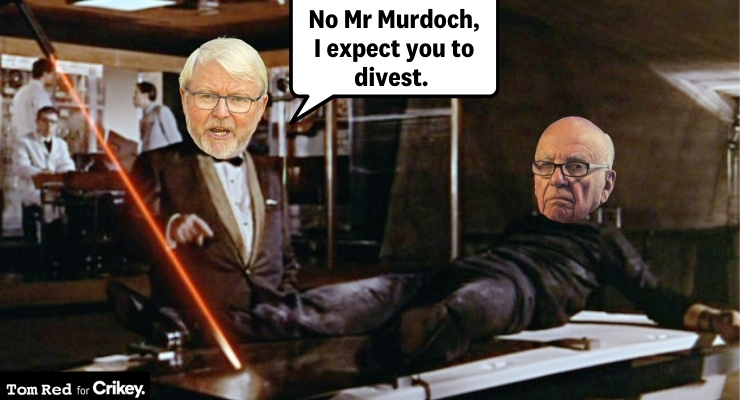
Former prime minister Kevin Rudd beamed out of the screen with a supernatural and beatific calm, as though the prime minister’s office was merely a stepping stone to this period, his true destiny, his star child stage, giving Rupert Murdoch both barrels at every opportunity.
He rattled off example after example of the “cancerous” affect News Corp has had on Australian democracy — if you wanted to know about racism, sexism, climate denial, COVID misinformation in the Murdoch media, Rudd had three examples and a page of footnotes.
There was a sense that no one else in the room had done as much homework as he — which may have been true of most rooms he’s been in. But it went further than that. It added to the impression no one else at Monday’s Senate inquiry into media diversity had quite so clear an idea of what they were trying to achieve. The hearing subjected attendees to the zoom call’s uncanny ability to find one’s worst angle and least ideal lighting, interspersed with music that sounds like Solsbury Hill played on keyboards used to score corporate videos in 1994.
The nominal reason that brought everyone together was the removal of Sky News content from YouTube for breaches around its guidelines — all parties consulted their scripts, and while senators Sarah Hanson-Young and Kim Carr did a fine job, it wasn’t always clear where they were going.
During a decidedly public servant performance from Nerida O’Loughlin of the Australian Communications and Media Authority — pressed on whether it had sufficient powers to deal with issues like misinformation she merely said, “We have been given powers from the Parliament for a co-regulatory approach,” or something similarly meaningful — Carr could be be heard off mic saying: “… had a gutful.”
Rudd followed Sky News CEO Paul Whittaker, who took the standard News Corp editorial line when it’s held to account — venerating freedom of speech, a bustling public square of ideas, both of which are threatened by the YouTube’s out-of-control power and opaque processes. Which is fair. Except he wouldn’t follow that thought through to its logical conclusion — greater regulation — because that would go against News’ real interest which is keeping things extremely close to how they already are.
For all the bluster that attended YouTube’s COVID misinformation decision, the difference of opinion between Sky and YouTube is a narrow one. YouTube pays Sky News and puts it in front of an audience many hundreds of times bigger than it could expect elsewhere. It suits both parties well.
Not that it stops Whittaker railing against “faceless internet elites” deciding what everyday Australians can and can’t watch. He made a point of calling YouTube a foreign-owned company having influence over Australia, which allowed Carr to force Whittaker into admitting that News Corp is a foreign-owned company too, one of the few gotchas of the day.
Whittaker also promised to never interview far-right extremist Blair Cottrell again and refused to directly concede that anything taken off YouTube qualified as misinformation. That afternoon Morgan C Jonas, the partner of Monica Smit, the prolific anti-vaxxer arrested for organising anti-lockdown protests posted that he was going on Sky News to talk to Rita Pahani. He later added a comment that the segment wasn’t aired.
Senator Alex Antic, an aspiring Liberal Party culture warrior from South Australia, had a clearer idea of what the day was for, happy to take advantage of the hearing as content generator and ask questions about the ABC. By the evening he’d posted an excerpt to Facebook which featured the phrases “freedom of speech”, “the political and cultural elites” and narrowing “the range of available political viewpoints in the virtual public square”.
The Northern Territory’s Liberal Senator Sam McMahon took things a titch weirder, drawing a bow so long it could span a small city by arguing that Sky presenter Cory Bernardi’s tweet “Ivermectin will set you free” was not referring to its use as a (debunked) treatment for COVID-19, but for something else, like maybe scabies. She was worried about “demonising” ivermectin.
Among the weirdness, and lots of the lofty rhetoric, the interesting stuff concerned the concrete, the material. Hanson-Young asked Whittaker about the power dynamic between Sky News producers — frequently just out of uni — and the spittle-flecked carnival barkers of Sky after dark. Is this kid really going to be able to tell Alan Jones that speculating that a young woman who died of COVID *really* died of a heart attack is grubby, dishonest and not fit to broadcast?
Hanson-Young was explicitly thinking of the caption that hung at the bottom of Outsiders while the hosts and David Leyonjhelm chatted airily about her sex life, which resulted in an on-air apology and a young producer chucked “under the bus”.
It won’t make the headlines, but the acknowledgment of material working conditions in the media and their impact on the news we get was a welcome relief.
Of course, that wasn’t what the majority of attendees thought the day was for.
Editors note: this piece has been amended to reflect Jones’ comment that the interview with Pahani was not aired.








Crikey is committed to hosting lively discussions. Help us keep the conversation useful, interesting and welcoming. We aim to publish comments quickly in the interest of promoting robust conversation, but we’re a small team and we deploy filters to protect against legal risk. Occasionally your comment may be held up while we review, but we’re working as fast as we can to keep the conversation rolling.
The Crikey comment section is members-only content. Please subscribe to leave a comment.
The Crikey comment section is members-only content. Please login to leave a comment.